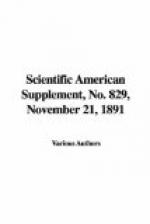The raisin industry in California is very young. To be sure, dried grapes have been known since the time of the Mission Fathers, but the dried mission grape is not a raisin. The men who thirty years ago sent over to Europe for the choicest varieties of wine grapes imported among other cuttings the Muscatel, the Muscat of Alexandria, and the Feher Zagos; the three finest raisin grapes of Spain. But the raisin, like the fig, requires skillful treatment, and for years the California grower made no headway. He read all that had been written on the curing of the raisin; several enterprising men went to Spain to study the subject at first hand; but despite all this no progress was made. Finally several of the pioneer raisin men of Fresno cut loose from all precedent, dried their grapes in the simple and natural manner and made a success of it. From that time, not over ten years ago, the growth of the industry has eclipsed that of every other branch of horticulture in the State, and the total value of the product promises soon to exceed the value of the orange crop or the yield of wine and brandy.
It required a good deal of nerve for the pioneers of Fresno County to spend hundreds of thousands of dollars in bringing water upon what the old settlers regarded as a desert, fit only to grow wheat in a very wet season. In other parts of the State the Mission Fathers had dug ditches and built aqueducts, so that the settlers who came after them found a well devised water system, which they merely followed. But in Fresno no one had ever tried to grow crops by irrigation. When Fremont came through there from the mountains he found many wild cattle feeding on the rank grass that grew as high as the head of a man on horseback. The herds of the native Californians were almost equally wild. The country was one vast plain which in summer glowed under a sun that was tropical in its intensity. As late as 1860 one could travel for a day without seeing a house or any sign of habitation. The country was owned by great cattle growers, who seldom rode over their immense ranches, except at the time of the annual “round-up” of stock. About thirty years ago a number of large wheat growers secured big tracts of land around Fresno. At their head was Isaac Friedlander, known as the wheat king of the Pacific Coast. Friedlander would have transformed this country had not financial ruin overcome him. His place was taken by others, like Chapman, Easterby, Eisen and Hughes—men who believed in fruit growing and who had the courage to carry on their operations in the face of repeated failures.




